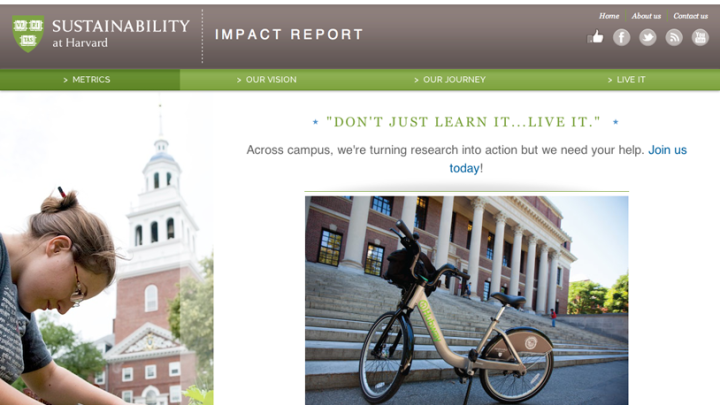Harvard this fall released its first University-wide Sustainability Impact Report—an interactive website filled with data on efforts to make the campus environmentally friendly. “We’re trying to be very transparent and use an online platform to encourage our community to have an honest and open conversation about the challenges we face in implementing Harvard’s sustainability goals, so we can develop solutions that will help us move forward,” explained Heather Henriksen, director of the Office for Sustainability. Those goals are challenging—notably, to reduce emissions of greenhouse gases (GHG) sharply. Progress to date reflects myriad energy-conservation projects as well as investments in clean energy sources (such as electricity purchases from a Maine wind farm and the installation of solar hot-water panels in Harvard Yard and of photovoltaic cells on the Gordon Indoor Track roof).
A “metrics” section in the report includes interactive charts and graphs that present a variety of data from across the campus, including information on energy and emissions, transportation, health and wellness, water use, green buildings, waste reduction, and recycling. According to the “Our Vision” section, the University has made three specific commitments to sustainability:
- Reduce GHG emissions 30 percent below a fiscal year 2006 baseline by 2016, including growth in facilities (adopted in 2008).
- Comply with comprehensive Green Building Standards for capital projects, renovations, and building-system upgrades costing $100,000 and above (adopted 2009, following 2007 guidelines that applied to projects of $5 million or more).
- Adhere to campus-wide Sustainability Principles that provide a broad vision to guide University operations and planning (adopted in 2004).
The “Our Journey” section of the website offers a timeline that lets users scroll through photographs and facts highlighting the University’s movement toward a green campus since a community event attended by 15,000 people in Tercentenary Theatre in the fall of 2008, keynoted by Al Gore ’69, LL.D. ’94. “Sustainability at Harvard is about more than recycling and turning off lights,” it states. “It’s about shifting the culture of an institution and inspiring the next generation of environmental leaders.”
These data, compiled by Henriksen’s office, highlight the current status of Harvard’s progress toward achieving the sustainability goals:
GHG emissions: Emissions were reduced 16 percent from fiscal 2006 to 2012, despite the three million square feet of growth on campus during that period. Excluding that growth, emissions in fiscal 2006 “base buildings” have dropped 24 percent. As of 2012, 23 percent of electricity is generated from renewable or alternative energy sources.
Green Buildings: As of October 2012, the University has 78 certified and 23 registered LEED building projects (a project must be registered before it can be evaluated for certification).
Energy Conservation: To date, a thousand energy-conservation measures have been implemented, yielding an annual savings of $9 million.
Green Loan Fund: To date, the fund has loaned more than $15 million to various campus schools and departments supporting nearly 200 projects that have yielded more than $4 million in energy savings annually.
For further information, including data on transportation, solid waste, and water usage, see the website at http://report.green.harvard.edu.







